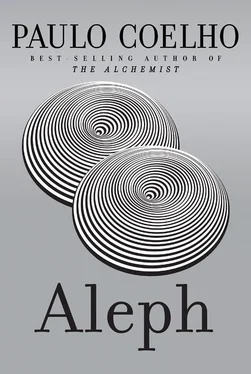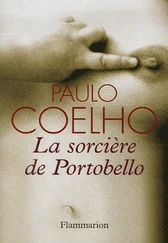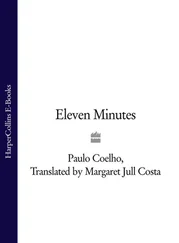My publishers are right about Yao. He does seem to want to show everyone that he occupies a privileged position in “my kingdom.” I understand his sadness at losing the woman he loved, and, when the moment comes, I’ll find the right words to say this. I’m afraid, though, that what he wants is to tell me “an amazing story that would make a fantastic book.” I’ve heard this many times before, especially from people who have lost someone they love.
I decide to try to please everyone.
“I’ll walk back to the hotel with Yao. After that, I need a bit of time alone.” This will be my first night alone since we set off.
…
THE TEMPERATURE HAS DROPPED more than we imagined, the wind is blowing, and it feels intensely cold. We walk along a crowded street, and I see that I’m not the only one wanting to head straight home. The doors of the shops are closing, the chairs are already piled up on the tables, and the neon lights are starting to go out. Even so, after a day and a half shut up in a train and knowing that we still have many, many kilometers ahead of us, I need to take every opportunity to do some physical exercise.
Yao stops next to a van selling drinks and asks for two orange juices. I don’t particularly want to drink anything, but perhaps a little vitamin C would be a good idea in this cold weather.
“Keep the cup.”
I don’t quite know why he’s telling me to do so, but I do as he says. We continue walking down what must be the main street in Ekaterinburg. At one point, we stop outside a cinema.
“Perfect. With your hood and scarf on, no one will recognize you. Let’s do a little begging.”
“Begging? Look, I haven’t done that since my hippie days, and besides, it would be an insult to people who are in real need.”
“But you are in real need. When we visited the Ipatiev House, there were moments when you simply weren’t there, when you seemed distant, trapped in the past, constrained by everything you’ve achieved and by everything you’re doing your best to cling onto. I’m worried about the girl, too, but if you really want to change, then begging will help you become more innocent, more open.”
I am worried about Hilal, but I tell him that—while I understand what he’s saying—one of my many motives for making this trip is to travel back into the past, into what lies underground, to my roots.
I’m about to tell him about the Chinese bamboo but decide against it.
“You’re the one who’s trapped by time. You refuse to accept that your wife is dead, which is why she’s still here by your side, trying to console you, when, by now, she should be moving on toward an encounter with the Divine Light. No one ever loses anyone. We are all one soul that needs to continue growing and developing in order for the world to carry on and for us all to meet once again. Sadness really doesn’t help.”
He thinks about what I’ve said, then adds, “But that can’t be the whole answer.”
“No, it’s not,” I agree. “When the time is right, I’ll explain more fully. Now, let’s go back to the hotel.”
Yao holds out his cup and starts asking for money from passersby. He suggests that I do the same.
“Some Zen Buddhist monks in Japan told me about takuhatsu , the begging pilgrimage. As well as helping the monasteries, which depend for their existence on donations, it teaches the student monk humility. It has another purpose, too, that of purifying the town in which the monk lives. This is because, according to Zen philosophy, the giver, the beggar, and the alms money itself all form part of an important chain of equilibrium. The person doing the begging does so because he’s needy, but the person doing the giving also does so out of need. The alms money serves as a link between these two needs, and the atmosphere in the town improves because everyone is able to act in a way in which he or she needed to act. You are on a pilgrimage, and it’s time to do something for the cities you visit.”
I’m so surprised, I don’t know what to say. Realizing that he might have gone too far, Yao starts putting his plastic cup back into his pocket.
“No,” I say, “it’s a really good idea!”
For the next ten minutes, we stand there, on opposite pavements, shifting from foot to foot to stave off the cold, our cups held out to the people who pass. At first, I say nothing, but I gradually lose my inhibitions and start asking for help as a poor lost stranger.
I’ve never felt awkward about asking. I’ve known lots of people who care about others and are extremely generous when it comes to giving and who feel real pleasure when someone asks them for advice or help. And that’s fine; it’s a good thing to help your neighbor. On the other hand, I know very few people capable of receiving, even when the gift is given with love and generosity. It’s as if the act of receiving made them feel inferior, as if depending on someone else was undignified. They think, If someone is giving us something, that’s because we’re incapable of getting it for ourselves . Or else, The person giving me this now will one day ask for it back with interest . Or, even worse, I don’t deserve to be treated well .
But those ten minutes remind me of the person I was; they educate me, free me. In the end, when I cross the street to join Yao, I have the equivalent of eleven dollars in my plastic cup. Yao has about the same amount. And contrary to what he thought, it had been a really enjoyable return to the past, reliving something I hadn’t experienced in ages and thus renewing not only the city but myself.
“What shall we do with the money?” I ask.
My view of him is beginning to shift again. He knows some things, and I know others, and there’s no reason why we can’t continue this mutual learning experience.
“In theory, it’s ours, because it was given to us, but it’s best to keep it somewhere separate and spend it on something you think is important.”
I put the coins in my left pocket, intending to do exactly that. We walk quickly back to the hotel, because the time we’ve spent outside has burned up all the calories we consumed at supper.
WHEN WE REACH THE LOBBY, the omnipresent Hilal is waiting for us. And a very pretty woman and a gentleman in a suit and tie stand next to her.
“Hello,” I say to Hilal. “I understand that you’ve gone back home, but it’s been a pleasure to have traveled this first leg of the journey with you. Are these your parents?”
The man does not react, but the pretty woman laughs.
“If only we were! She’s a prodigy, this girl. It’s a shame she can’t spend more time on her vocation, though. The world is missing out on a great artist!”
Hilal appears not to have heard this remark. She turns to me and says, “ ‘Hello’? Is that all you’ve got to say to me after what happened on the train?”
The woman looks shocked. I can imagine what she’s thinking: What exactly happened on the train? And don’t I realize that I’m old enough to be Hilal’s father?
Yao says that it’s time he went up to his room. The man in the suit and tie remains impassive, possibly because he doesn’t understand English.
“Nothing happened on the train, at least not the kind of thing you’re imagining. And as for you, Hilal, what were you expecting me to say? That I missed you? I spent all day worrying about you.”
The woman translates this for the man in the suit and tie, and everyone smiles, including Hilal. She has understood from my response that I really had missed her, since I had said so quite spontaneously.
I ask Yao to stay a little longer because I don’t know where this conversation is going to lead. We sit down and order some tea. The woman introduces herself as a violin teacher and explains that the gentleman with them is the director of the local conservatory.
Читать дальше






